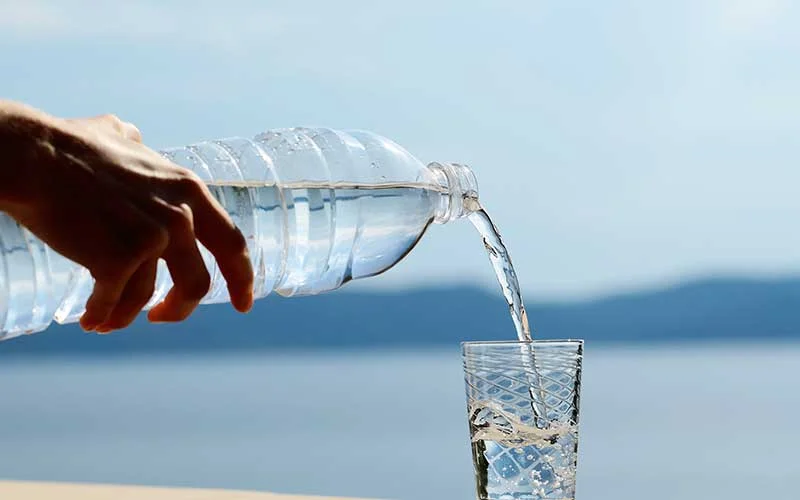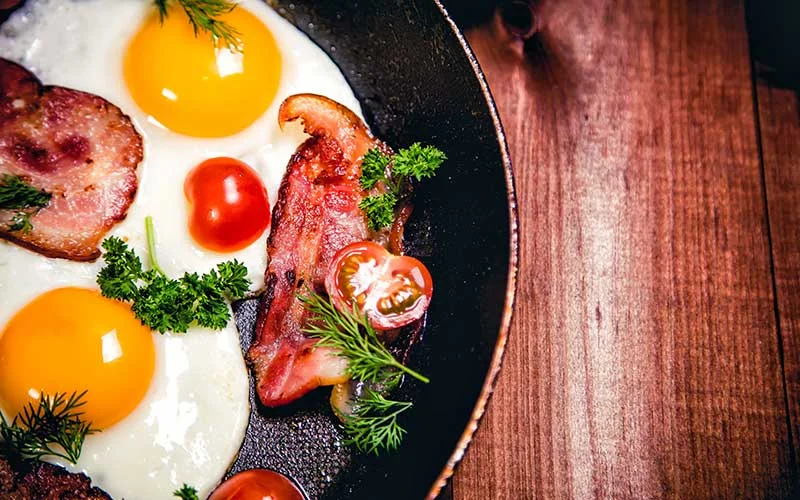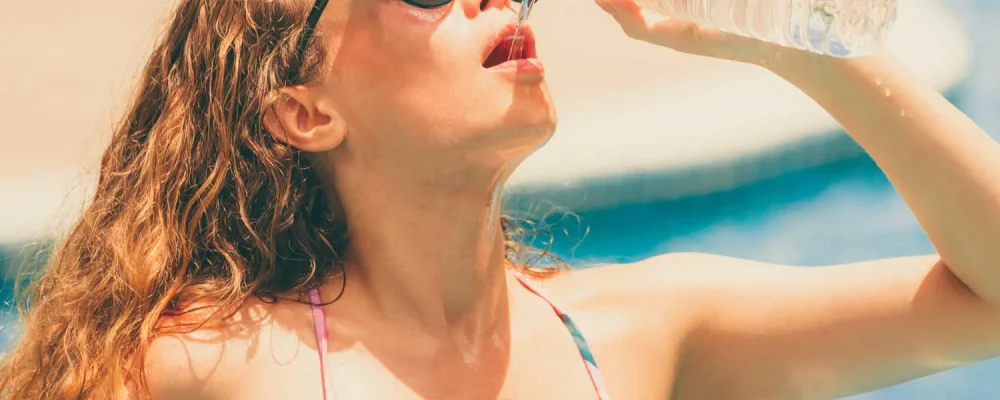Staying hydrated is super important during a heatwave! As the temperatures soar, keeping yourself cool and refreshed is essential to avoid feeling exhausted or even getting heat-related illnesses. Dehydration can cause fatigue, dizziness, and even more severe conditions like heat exhaustion or heatstroke. This article will discuss tips to help you stay hydrated and safe during a heatwave. These strategies will help you beat the heat and keep your body hydrated, indoors or outdoors.
How Much Water Do You Need?
There is no one-size-fits-all guideline for daily water intake, according to physicians. Your body, health conditions, medications, and other factors will influence how much water you should consume each day.
Although there are broad suggestions for both women and men, there is no set amount of plain water that adults and children should consume daily. One general guideline is that men should drink an average of 3.7 liters of water daily, while women should aim for about 2.7 liters [1]. You can also calculate how many ounces you should drink daily by dividing your body weight in pounds by two. Whatever the case, you shouldn’t have to make an effort to drink water; it should just be a part of your everyday routine.
How To Stay Hydrated During A Heat Wave?

The weather is hot in many countries, including the United States, China, Europe, and many other countries in Asia. People in these areas must be careful and keep themselves safe and healthy. Here are some easy tips to help you stay hydrated during this hot weather:
Drink Lots of Fluids
Determining how much fluid your body loses when temperatures rise might be difficult. We all know that when it’s hot outside, our bodies emit fluid in the form of sweat, but if it’s also highly humid, it could be difficult to tell how much sweat your body is creating.
Drinking when you’re thirsty is the cardinal rule of staying hydrated. However, if you struggle to get motivated to drink plain water like many others, don’t worry. Fortunately, beverages other than water can effectively replenish your body’s fluid levels. Teas, milk, juices, and sodas can all help you stay hydrated. But remember, juices and sodas contain a lot of sugar, which can provide a separate health risk. However, with hydration being so important your best action might be reaching for any drink that keeps you hydrated.
Fresh Water
When it’s hot outside, drinking lots of water is important to stay healthy. Water helps our bodies work well and keeps us cool. Carry a water bottle and take small sips regularly, even if you’re not very thirsty. If plain water is boring, add fruit slices like lemon or berries to make it taste better. Remember, drinking enough water is crucial to avoid feeling sick during hot days.
Fresh Produce
Eating fresh fruits and vegetables is a yummy way to stay hydrated in the heat. Some fruits and veggies have lots of water, which helps us stay refreshed. Watermelon, cucumber, oranges, and strawberries are great choices. These foods keep us hydrated and give us important vitamins and minerals to stay healthy.
Sports Drinks
Sports drinks are good for people who do lots of physical activities in hot weather because they give back important substances called electrolytes that we lose when we sweat. But we should be careful because they can have a lot of sugar. Plus, some contain caffeine which can also contribute to dehydration.
Meal Replacement Shakes
While water is the best choice for staying hydrated, meal replacement shakes can also offer hydration benefits. Along with keeping us hydrated, they can add nutrients when we can’t find fresh food or water. Pick ones with less sugar and more good stuff for our bodies.
Water Enhancer
Water enhancers can be useful for staying hydrated during a heatwave by making water more appealing and encouraging regular consumption. Water enhancers flavor plain water, encouraging people to drink more and stay hydrated, especially during heat waves. They typically come in liquid drops, powders, or tablets that can be easily added to water. Water enhancers are popular for those who find plain water unappealing or struggle to drink enough. However, they should be used in moderation, and the focus should still be on drinking plain water as the primary source of hydration.
Eat Hydrating Foods
Fresh fruits and vegetables are ideal sources of hydration, but any food or beverage with liquid can do. They have a high water content and other nutrients, including fiber, that is good for your general health.
Oranges, watermelons, peaches, berries, and grapes are all excellent choices. Produce that is juicy, such as cucumbers, celery, and olives, is also very liquid. You can also stay hydrated by eating liquid-based meals like soups or cereal.
A cooling and hydrating double whammy can be had from frozen delicacies. Ice pops, slushies, and sorbets can be pleasant and entertaining ways to drink more water while offering a cool reprieve from the heat.
Avoid Foods That Are Hard to Digest

According to research, some individuals and animals consume less food when the weather is hot [2]. This is because metabolizing food requires a lot of energy and may increase body temperature. Regardless of the weather, it is never a good idea to stop eating, although some foods are more difficult to digest than others. These foods are “thermogenic,” which means that throughout the strenuous digesting process, they generate heat inside your body.
For instance, all types of protein, such as red meat, fish, and eggs, are quite thermogenic. Thermogenic foods include whole grains, sweet potatoes, and dishes with cayenne and ginger. Despite this, eating raises your body temperature slightly, and most healthy people won’t experience any significant effects from consuming meals that raise body temperature.
Limit Alcohol and Caffeine Intake
Studies have shown that drinking coffee or other caffeine beverages can hydrate the body and water, but those sensitive to caffeine may not get the same benefits. If you regularly consume coffee, your body may have gotten used to the caffeine, which won’t affect your ability to stay hydrated [3]. It’s generally advisable to avoid drinking that beer during a heat wave. Research has proven that alcohol is a diuretic, leading your body to lose more water, even though it may be tempting to crack open a cold one.
It can also be wise to consume more than just water. In addition to losing water when you sweat, you also expel salts. You are probably a salty sweater if your clothing still has rings after you sweat. Therefore, replacing those salts and electrolytes is equally important. You can accomplish this with sports drinks or by eating certain foods.
FAQs
When to Stay Out of the Sun?
Avoid direct sun exposure between 10 AM to 4 PM because that’s when the sun is strongest and can harm your skin. If you need to go outside during these hours, cover up with clothes and wear a wide hat to protect your skin as much as possible.
Can You Drink Too Much Water?
Drinking too much water in a short time can harm your body. It’s like overwhelming your blood with too much water, which can upset the balance inside your body. This balance is essential for your body to work properly. When there’s too much water and not enough salt in your blood, it can cause serious problems.
How Can I Tell If I’m Properly Hydrated?
One way to check your hydration level is to observe the color of your urine. If it’s pale yellow or straw-colored, you are likely well-hydrated. Dark yellow or amber urine may indicate dehydration. Additionally, pay attention to your body’s signals: if you feel thirsty, experience dry mouth, or have a headache, it’s a sign that you need to drink more fluids.
What Hydrates Better Than Water?
Milk is more hydrating than water. Because milk contains sugar, lactose, protein, and fat, all of which help slow the emptying of liquids from the stomach and maintain hydration over a longer period, milk has been proven to be even more hydrating than plain water.
Final Thoughts
Staying hydrated during a heat wave is vital for your health and safety. Pay attention to your body’s signals, and drink fluids regularly. Whether you prefer water, juices, or other beverages, remember the importance of moderation and choose hydrating foods to stay refreshed.
Be cautious with alcohol and caffeine intake, and protect yourself from the sun’s peak hours. Seek out hydrating flavored powders that offer your body benefits and your pallet something to look forward to. Following these simple tips, you can stay hydrated and enjoy the summer without compromising your well-being.
Sources
[1] Centers for Disease Control and Prevention. (2016). NCHS Data Brief, No. 242. Prevalence of Obesity and Severe Obesity Among Adults: United States, 2017-2018. Retrieved from https://www.cdc.gov/nchs/products/databriefs/db242.htm
[2] National Center for Biotechnology Information. (2012). StatPearls [Internet]. Heat Exhaustion. Treasure Island (FL): StatPearls Publishing. Retrieved from https://www.ncbi.nlm.nih.gov/books/NBK236229/
[3] Armstrong, L. E., Ganio, M. S., Casa, D. J., Lee, E. C., McDermott, B. P., Klau, J. F., … Maresh, C. M. (2012). Mild dehydration affects mood in healthy young women. The Journal of Nutrition, 142(2), 382-388. Retrieved from https://www.ncbi.nlm.nih.gov/pmc/articles/PMC3886980/
RV Team
* Reviewology is in partnership or collaborates with top brands highlighted on this site, including those occupying the top ranking positions.
Additionally, we earn affiliate commissions from products showcased on this website when you make a purchase through the provided links on Amazon or the company website directly.
We appreciate your support using our links to purchase your favorite brands or newly discovered brands.
Latest updates
I Thought I’d Always Feel Tired, Fat, and Forgotten—Until This
310 Greens vs AG1
The Truth About 310 Greens: A No-Nonsense Review of This Popular Supplement
Popular
I Thought I’d Always Feel Tired, Fat, and Forgotten—Until This
310 Greens vs AG1
The Truth About 310 Greens: A No-Nonsense Review of This Popular Supplement
© 2024 Reviewology. All Rights Reserved.
